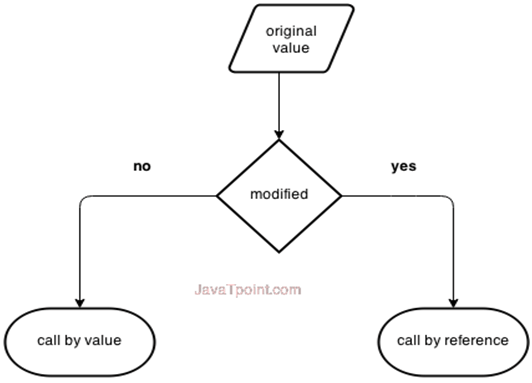📌 相关文章
- c# 引用调用 - C# (1)
- c# 引用调用 - C# 代码示例
- C中按值调用和按引用调用(1)
- C中按值调用和按引用调用
- 调用类 c# (1)
- 调用类 c# (1)
- C#函数 按引用调用
- JavaScript 中按值调用与按引用调用
- JavaScript 中按值调用与按引用调用(1)
- 在Java中按值调用和按引用调用
- 在Java中按值调用和按引用调用(1)
- 什么是按值调用和按引用调用 (1)
- 通过引用调用 c++ (1)
- php函数-引用调用(1)
- php函数-引用调用
- 什么是按值调用和按引用调用 - 无论代码示例
- 通过引用调用 c++ 代码示例
- 通过地址调用更有效的引用调用 (1)
- Python中的可调用()(1)
- Python中的可调用()
- 从 python 调用 c#(1)
- 调用类 c# 代码示例
- 调用类 c# 代码示例
- Python是按引用调用还是按值调用
- Python是按引用调用还是按值调用(1)
- 通过地址调用更有效的引用调用 - 无论代码示例
- 系统调用和库调用的区别(1)
- 系统调用和库调用的区别
- 从 python 代码示例调用 c#
📜 C++ 值调用和 引用调用
📅 最后修改于: 2020-10-17 04:57:34 🧑 作者: Mango
在C++中按值调用和按引用调用
有两种将值或数据传递给C语言函数:按值调用和按引用调用。原始值不会在按值调用中进行修改,但会在按引用进行调用时进行修改。

让我们一一理解C++语言中的按值调用和按引用调用。
在C++中按值调用
在按值调用中,原始值不会被修改。
在按值调用中,传递给函数的值由函数参数本地存储在堆栈存储器位置中。如果更改函数参数的值,则仅对当前函数更改。它不会更改调用方方法(例如main())内的变量值。
让我们尝试通过以下示例理解C++语言中按值调用的概念:
#include
using namespace std;
void change(int data);
int main()
{
int data = 3;
change(data);
cout << "Value of the data is: " << data<< endl;
return 0;
}
void change(int data)
{
data = 5;
}
输出:
Value of the data is: 3
在C++中通过引用调用
在通过引用进行调用时,因为我们传递了引用(地址),所以原始值被修改。
此处,值的地址在函数传递,因此实际参数和形式参数共享相同的地址空间。因此,在函数内部改变值,被反射内以及之外的函数。
注意:要通过引用了解调用,您必须具有指针的基本知识。
让我们尝试通过以下示例理解C++语言中的引用调用的概念:
#include
using namespace std;
void swap(int *x, int *y)
{
int swap;
swap=*x;
*x=*y;
*y=swap;
}
int main()
{
int x=500, y=100;
swap(&x, &y); // passing value to function
cout<<"Value of x is: "< 输出:
Value of x is: 100
Value of y is: 500
C++中按值调用和按引用调用之间的区别
| No. | Call by value | Call by reference |
|---|---|---|
| 1 | A copy of value is passed to the function | An address of value is passed to the function |
| 2 | Changes made inside the function is not reflected on other functions | Changes made inside the function is reflected outside the function also |
| 3 | Actual and formal arguments will be created in different memory location | Actual and formal arguments will be created in same memory location |